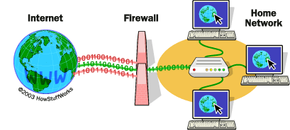Firewalls are customizable. This means that you can add or remove filters based on several conditions. Some of these are:
IP addresses - Each machine on the Internet is assigned a unique address called an IP address. IP addresses are 32-bit numbers, normally expressed as four "octets" in a "dotted decimal number." A typical IP address looks like this: 216.27.61.137. For example, if a certain IP address outside the company is reading too many files from a server, the firewall can block all traffic to or from that IP address.
Domain names - Because it is hard to remember the string of numbers that make up an IP address, and because IP addresses sometimes need to change, all servers on the Internet also have human-readable names, called domain names. For example, it is easier for most of us to remember www.howstuffworks.com than it is to remember 216.27.61.137. A company might block all access to certain domain names, or allow access only to specific domain names. Protocols - The protocol is the pre-defined way that someone who wants to use a service talks with that service. The "someone" could be a person, but more often it is a computer program like a Web browser. Protocols are often text, and simply describe how the client and server will have their conversation. The http in the Web's protocol. Some common protocols that you can set firewall filters for include:
- IP (Internet Protocol) - the main delivery system for information over the Internet
- TCP (Transmission Control Protocol) - used to break apart and rebuild information that travels over the Internet
- HTTP (Hyper Text Transfer Protocol) - used for Web pages
- FTP (File Transfer Protocol) - used to download and upload files
- UDP (User Datagram Protocol) - used for information that requires no response, such as streaming audio and video
- ICMP (Internet Control Message Protocol) - used by a router to exchange the information with other routers
- SMTP (Simple Mail Transport Protocol) - used to send text-based information (e-mail)
- SNMP (Simple Network Management Protocol) - used to collect system information from a remote computer
- Telnet - used to perform commands on a remote computer
A company might set up only one or two machines to handle a specific protocol and ban that protocol on all other machines.
Ports - Any server machine makes its services available to the Internet using numbered ports, one for each service that is available on the server (see How Web Servers Work for details). For example, if a server machine is running a Web (HTTP) server and an FTP server, the Web server would typically be available on port 80, and the FTP server would be available on port 21. A company might block port 21 access on all machines but one inside the company.
Specific words and phrases - This can be anything. The firewall will sniff (search through) each packet of information for an exact match of the text listed in the filter. For example, you could instruct the firewall to block any packet with the word "X-rated" in it. The key here is that it has to be an exact match. The "X-rated" filter would not catch "X rated" (no hyphen). But you can include as many words, phrases and variations of them as you need.
Some operating systems come with a firewall built in. Otherwise, a software firewall can be installed on the computer in your home that has an Internet connection. This computer is considered a gateway because it provides the only point of access between your home network and the Internet.
With a hardware firewall, the firewall unit itself is normally the gateway. A good example is the Linksys Cable/DSL router. It has a built-in Ethernet card and hub. Computers in your home network connect to the router, which in turn is connected to either a cable or DSL modem. You configure the router via a Web-based interface that you reach through the browser on your computer. You can then set any filters or additional information.
Hardware firewalls are incredibly secure and not very expensive. Home versions that include a router, firewall and Ethernet hub for broadband connections can be found for well under $100.


